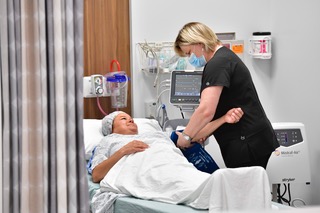If you are struggling with lower back pain that radiates down your leg, you might have hit the internet searching for answers, only to find the terms “sciatica” and “herniated disc” discussed frequently. This is because both conditions can cause debilitating back...
You open your eyes, stretch, and sit up, ready to start the day. But the moment your feet hit the floor, a sharp or aching pain shoots through your heels, arches, or the balls of your feet. Morning should feel refreshing, yet instead, you find yourself hobbling to the...
Are you a fitness enthusiast or a dedicated athlete who has suddenly been sidelined by a nagging, persistent pain in your calf and ankle? That sharp or aching sensation that flares up during or after activity could be the result of Achilles tendonitis. The Achilles...
What to Expect When Having Knee Replacement Surgery

With advancements in technology over the past 20 years, knee replacement surgery – one of the nation’s most common (and expected to rise as our population ages) – has been transformed, providing very substantial benefits to patients, as well as orthopaedic surgeons and hospital staff. What used to require a minimum of a three- to five-day stay in the hospital can now be completed in some cases as an outpatient procedure. More commonly, the post-surgery hospital stay is anywhere from one to three days, depending on the health of the patient.
If your knee is due for a replacement, it is important to understand what will happen. Of course, you should speak with your doctor about the procedure and the specific techniques he or she plans to use, but below is a general overview of what you can expect before and during surgery.
Before surgery you will be prepared or “prepped.” First, an IV line will be inserted through a vein in either your arm or hand, allowing intravenous liquids and medications to flow directly into your bloodstream. In addition, the skin around the incision area will be shaved. According to James Costanzo, M.D., a board-certified orthopaedist with Premier Orthopaedics at Crozer-Keystone Health System, “We want to avoid any situation which may invite bacteria to enter the surgical area. Shaving helps keep the area clean, which helps avoid complications in the future.” In most cases, spinal anesthesia is used. This is the best form of anesthesia because it completely numbs you from the waist down and is very low risk. In some patients, general anesthesia, in which you are completely asleep, may be necessary.
So how long does a typical knee replacement surgery take? According to Dr. Costanzo, “Assuming the patient is healthy and there are no complications, knee replacement surgery shouldn’t take more than two hours.”
What happens during knee replacement surgery?
Once you are prepped, your surgeon will perform the surgery by first removing the damaged part of the joint, along with the surfaces of the thigh bone and adjacent shin. They are then replaced with an artificial implant or device that mimics the knee’s function and mobility.
Patients who’ve undergone knee replacement typically report significantly better flexibility than they had before surgery, with their pain dramatically reduced or eliminated.
For more information about Premier Orthopaedics at Crozer-Keystone, and/or a physician referral, fill out our appointment form or call 855-255-6468.
